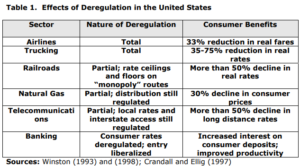We mentioned earlier this week the economic idiocy of Biden bringing back price controls to reduce inflation in the areas of pharmaceuticals, oil and gas, meat and poultry. This is a return to the ruinous price control era of the 1960s and 1970s, that created massive market inefficiencies and RAISED prices, rather than reduced them. Even Ted Kennedy and Jimmy Carter supported the end of failed price controls. It is incredibly disheartening that the modern left has unlearned all these lessons.
Here is the definitive tutorial from the Brookings Institution of what happened once deregulation in major industries lifted government price controls (we apologize that this is a little longer than normal for the Hotline, but this is REALLY important stuff that every Econ. 100 course should be teaching):
“In virtually every deregulated industry, there have been substantial gains in efficiency (Table 1). The firms supplying the service—new entrants and incumbents alike—produce it at costs about 30 percent lower than would have been incurred under the old regulatory regime. In addition, service quality tends to improve. Deregulation reduced airline fares, trucking costs, and railroad transportation costs by about $35 billion per year (in 1995 dollars), largely through improvements in efficiency. Similarly, reductions in long-distance telephone rates came about because of improved efficiency and the FCC’s more efficient pricing of interstate carrier access, not from reduced telephone-company profits.”
“By contrast, the United States’ inadvertent foray into controlling the field price of natural gas in the 1960s resulted in huge losses in economic welfare. Between 1968 and 1977, regulators kept natural gas prices artificially low and thereby transferred $39 billion from producers to consumers. However, this regulation created shortages in natural gas that subsequently cost consumers and producers $59 billion (in 1982 dollars). Subsequently, natural gas deregulation was phased in between 1978 and 1984, and prices were kept artificially high during most of this period. This spurred a ‘sell-off’ of gas at artificially low prices that cost producers $45 billion more than the gains to consumers. In all, 17 years of regulating the previously competitive natural gas extraction industry cost the United States more than $160 billion (in 1995 dollars), according to economist Paul MacAvoy.”

